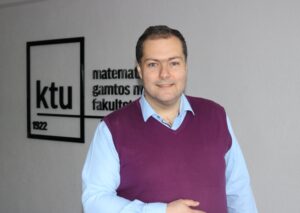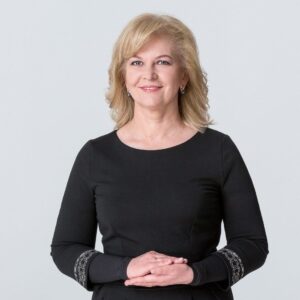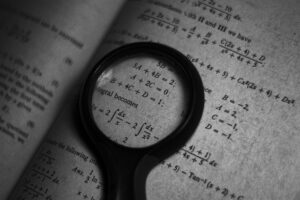Interviewer: Dean, do you agree with the professor’s idea that the future PhD program in mathematics will open a wide range of career opportunities for the graduates?
Dean Bronė Narkevičienė: There is no doubt that mathematics is the door to everyone’s success because there is no field in the world where mathematics is not applied. We believe that a graduate from three universities will be extraordinary because they will receive a high quality and broad-spectrum education, learning and growing alongside world-renowned scientists. Whether graduates choose a post-doctoral researcher’s path or a seek a career in business and industry, ample opportunities await for highly qualified professionals and independent researchers.
Interviewer: In Lithuania, there is a shortage of highly qualified mathematicians for both businesses and the public sector. This is a concern frequently emphasized by business leaders. Do you think that the creation of this new international PhD program in mathematics would help to address the need for these specialists?
Professor Miloš Kopa: Yes, the shortage of highly qualified mathematicians, especially in applied mathematics, is evident throughout the EU. The reason is that to train such experts requires a high-quality, long-term PhD program. International cooperation has enabled the new program to quickly reach the prominent level of quality demanded by both companies and the academic institutions.
The progress and economic success of any country depend in the quality education of its people, as well as on the ability of professionals to effectively apply their knowledge and unleash their talents.
The need for highly skilled professionals in the labor market is obvious. Every year, companies turn to our researchers for a variety of mathematical solutions, as the application of mathematical methods can help optimize business and production processes, solve problems in medical diagnostics and drug research, optimize organization processes and many other areas. Our scientists are working on such tasks at the annual “Workshop of Mathematical Solutions in Business and Industry”, and it will be a treasure for businesses when the PhD students will be trained together with foreign universities.
Interviewer: What will doctoral dissertations be focused on? Are they more research or more applied? Can companies expect future researchers to tackle problems that are specifically relevant to business or other sectors?
Dean Bronė Narkevičienė: The new program will cover both fundamental and applied mathematical research in areas such as differential equations, financial mathematics, mathematical modelling of biomedical systems, mathematical theory of operations and its applications, etc. It is therefore clear that the range of choices is overly broad indeed, and the student will decide which field to pursue by choosing the research and dissertation topic and supervisor.
The program we are developing is strong and broad enough to cover all mentioned research topics. Based on the availability of other PhD programs, I think that many students choose more applied topics because they are thinking about future careers in banking, medicine, defense or just business.
However, this doesn’t imply that fundamental research in mathematics lacks significance. I think that soon, fundamental research will also find applications in business, because recently, business has been adopting modern technologies very rapidly. In addition, theoretical topics could be more attractive to students thinking about an academic career.
Interviewer: Professor, will students at Charles University in Prague choose to study in Lithuania?
Professor Miloš Kopa: I prefer not to comment on the part-time studies of doctoral students from Georg-August Göttingen University at Kaunas University of Technology until we have initiated joint studies. However, it’s worth noting that there are currently very few doctoral students in mathematics at our university, Charles University in Prague.
Most of them have held a position in a business before choosing a PhD. They continue to do so during their studies. Their willingness to travel anywhere is therefore quite limited. Regarding future PhD students in mathematics who are yet to choose these three universities, I think that they will go to both Georg-August Göttingen and KTU, because they will be obliged to do so by their chosen study program.
Will they find it fascinating? Absolutely. In any case, I think that a temporary move to another country or university is beneficial. It helps them to make research contacts, to participate in joint research projects, to feel the pulse of their young colleagues from the visiting countries.
As far as student mobility in general is concerned, it is worth noting that there is an Erasmus agreement between KTU and Charles University in Prague. It should help to enhance overall student mobility.
Interviewer: What points of contact have you found with KTU?
Professor Miloš Kopa: First, the key factor in any university is the people who work there, from the dean to the students. I always feel welcomed here at KTU and see a friendly atmosphere, so I am happy to be part of KTU FMNS.
I particularly like the collaborative research with Professor Dr Audrius Kabašinskas and Associate Professor Dr Kristina Šutienė. We have published several papers in recent years, but we also have some peer-reviewed ones to be published later.
We are interested in financial mathematics, especially pension system analysis. As far as the pension system is concerned, Lithuania has a much more developed second pension pillar than the Czech Republic and other Central/Eastern European countries, that is why I like to analyze funds in Lithuania and other Baltic countries.
Such an analysis can draw upon not only on theoretical concepts, but also on real data from more than 15 years of history. So, unlike in other Central/Eastern European countries, we can let the data speak for itself. We are doing this in a joint project funded by the Research Council of Lithuania, we use data to answer the most interesting questions about pension funds.
I also enjoy lecturing to KTU undergraduates and postgraduates. While students may sometimes be shy, they are always interested in new topics. Lastly, I am honored to be able to make a small contribution to the development of the new PhD program in mathematics and I sincerely hope for its success.




